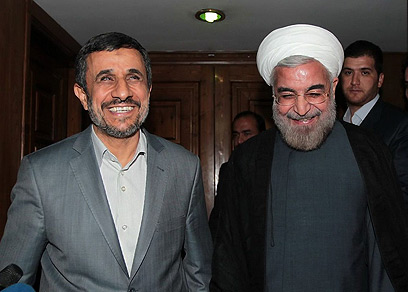WASHINGTON - Iranian President-elect Hassan Rohani personally stopped the development of a clandestine nuclear weapon in 2003, a former French ambassador to the country said Saturday.
Writing in the International Herald Tribune newspaper, Francois Nicoullaud, France's ambassador to Iran from 2001 to 2005, said he believed Rohani was the "main actor" in persuading Supreme Leader Ali Khamenei to halt the secret program.
Related stories:
- Report: Iran's Ahmadinejad to set up university
- Iranian exiles launch satirical program
- Rohani: Who are the Zionists to threaten us?
Since his victory in the June election, Western diplomats who previously worked with Rohani have expressed optimism as to his ability to make Khameni show more flexibility in talks with the West.
On Thursday, the New York Times quoted Western officials as saying that Iraqi Prime Minister Nouri al-Maliki told the Obama administration this month that Iran was interested in direct talks with the United States on Iran’s nuclear program, and said that Iraq was prepared to facilitate the negotiations.

Rohani and Ahmadinejad (Photo: AFP)
According to the New York Times, US State Department officials declined to comment on Maliki’s move or what steps the US might have taken in response. American officials have said since the beginning of the Obama administration that they would be open to direct talks with Iran.
“Rohani showed that he is a central player in Iran’s political establishment,” said Stanislas de Laboulaye, a retired director general of the French Foreign Ministry, who was a member of the European delegation during the talks between 2003 and 2005. “He was the only one able to sell something deeply unpopular to the other leaders.”
European diplomats talking to the NYT estimated that Rohani was willing to enter into serious negotiations on Iran's nuclear program and that he's determined to improve relations with the West.
They praised him for his diplomatic skills and flexibility. “He is perfectly placed in Iran’s system of power,” said Paul von Maltzahn, a former German ambassador to Iran who met Rohani several times. “He is not easily manipulated and assertive.”
Rohani was one of three Iranian officials to meet with the former national security adviser Robert McFarlane when he secretly visited Tehran in 1986 to arrange the arms-for-hostages deal that would later erupt into the Iran-contra scandal.
But despite growing optimism, Western diplomats warned that Rohani is still a Shiite cleric who has dedicated his life to the Islamic revolution and will never betray it.
“Our opponents are wrong to expect compromises from Rohani; the sanctions and other pressures will not make us change our stances,” said one of his former closest associates during an interview in Tehran.
And so, despite and maybe because of past experience, the West is none the wiser about what to expect from Rohani. Scheduled to be sworn in on August 3, the president-elect will likely change Iran's rhetoric but it's unclear whether he is willing and able to affect real change in Tehran's nuclear program.
- Receive Ynetnews updates
directly to your desktop















